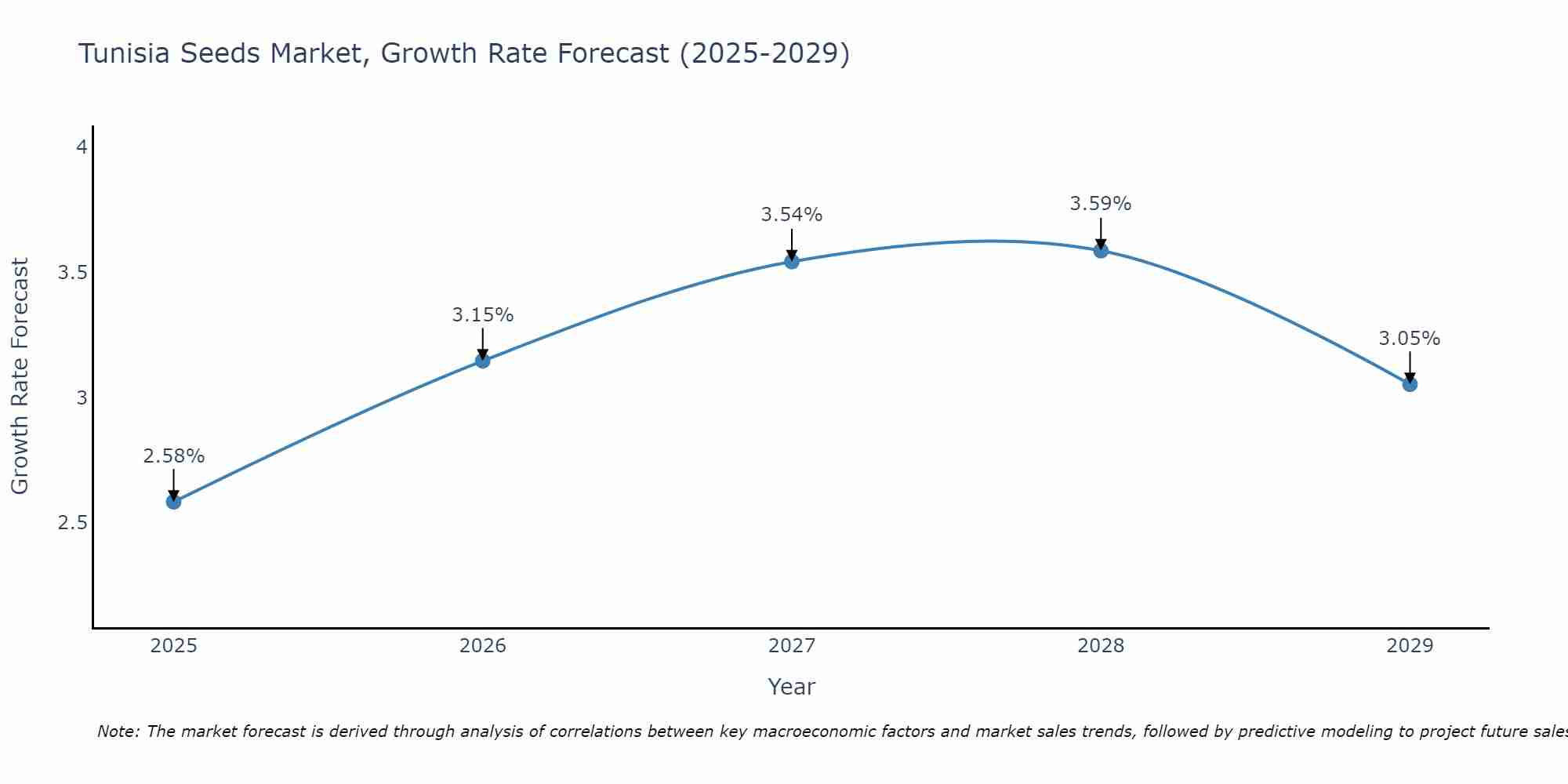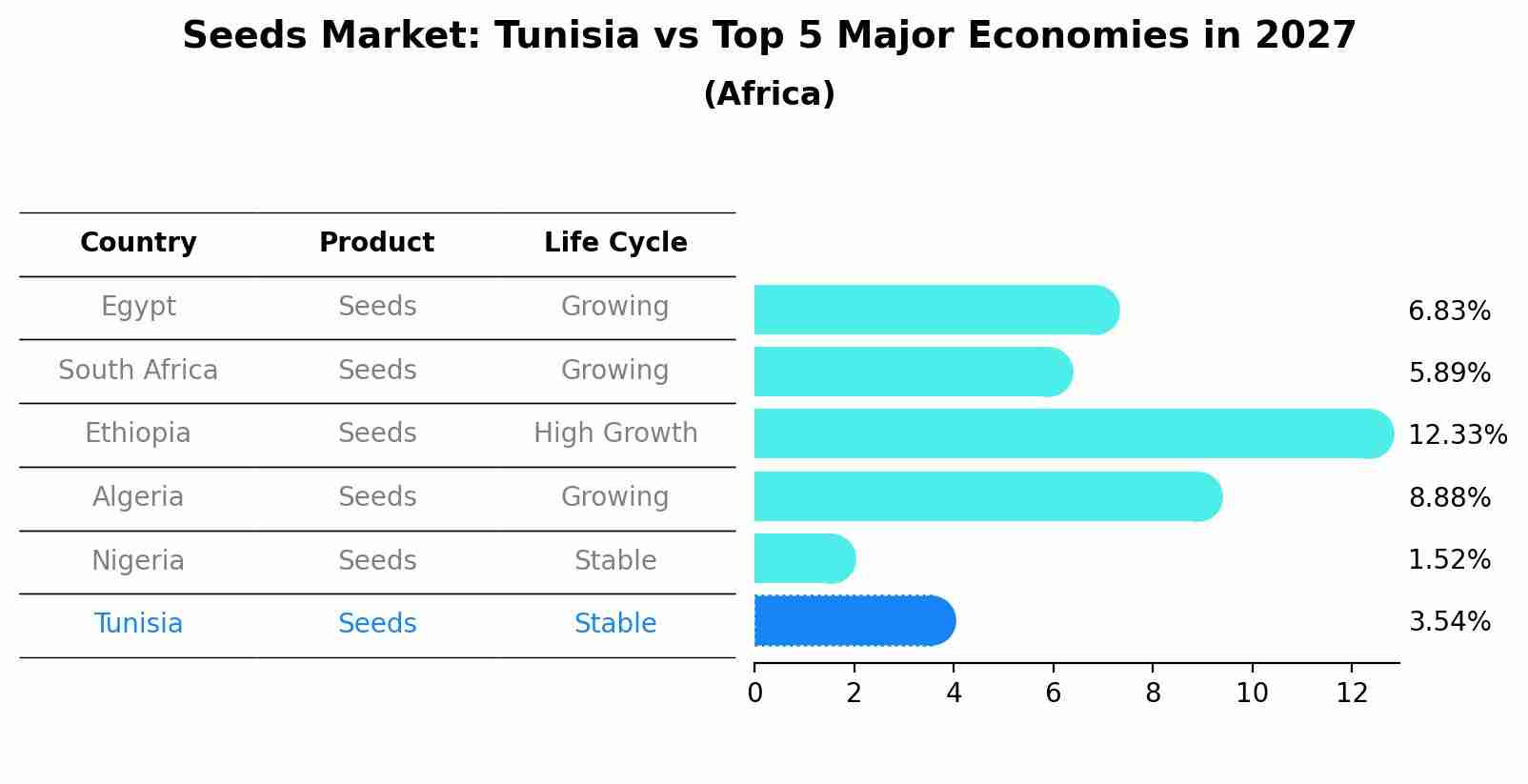Tunisia Seeds Market Outlook | COVID-19 IMPACT, Forecast, Companies, Industry, Revenue, Growth, Trends, Share, Value, Analysis & Size
| Product Code: ETC384714 | Publication Date: Aug 2022 | Updated Date: Jul 2025 | Product Type: Market Research Report | |
| Publisher: 6Wresearch | Author: Ravi Bhandari | No. of Pages: 75 | No. of Figures: 35 | No. of Tables: 20 |
Tunisia Seeds Market Size Growth Rate
The Tunisia Seeds Market is projected to witness mixed growth rate patterns during 2025 to 2029. The growth rate begins at 2.58% in 2025, climbs to a high of 3.59% in 2028, and moderates to 3.05% by 2029.

Seeds Market: Tunisia vs Top 5 Major Economies in 2027 (Africa)
The Seeds market in Tunisia is projected to grow at a stable growth rate of 3.54% by 2027, highlighting the country's increasing focus on advanced technologies within the Africa region, where Egypt holds the dominant position, followed closely by South Africa, Ethiopia, Algeria and Nigeria, shaping overall regional demand.

Tunisia Seeds Market Synopsis
The Tunisia seeds market is experiencing steady growth driven by increasing demand for high-quality seeds in the agriculture sector. The market offers a wide range of seeds including cereals, vegetables, fruits, and pulses to cater to the diverse needs of farmers. Key players in the market are focusing on research and development to introduce innovative seed varieties that are high-yielding, disease-resistant, and adapted to local climatic conditions. Government initiatives to promote modern agricultural practices and improve crop productivity are also fueling market growth. The market is characterized by intense competition among both domestic and international seed companies, leading to advancements in seed technology and distribution networks. Overall, the Tunisia seeds market is poised for further expansion as farmers increasingly seek to enhance their crop yields and quality.
Tunisia Seeds Market Trends
The Tunisia Seeds Market is witnessing several key trends, including a growing demand for organic and non-GMO seeds as consumers prioritize healthier and more sustainable food choices. There is also an increasing interest in drought-resistant and climate-adapted seeds to address the challenges posed by climate change and water scarcity in the region. Furthermore, technological advancements in seed breeding and biotechnology are driving innovation in the market, leading to the development of high-yielding and disease-resistant seed varieties. Additionally, the rising awareness about the importance of biodiversity conservation and the protection of indigenous seed varieties is influencing consumer preferences and shaping the seed market landscape in Tunisia. Overall, these trends indicate a shift towards more environmentally conscious and resilient agricultural practices in the country.
Tunisia Seeds Market Challenges
In the Tunisia Seeds Market, challenges such as limited access to modern technology and information, lack of investment in research and development, and variability in weather conditions pose significant hurdles for seed producers. Additionally, the presence of counterfeit seeds and the need for improved infrastructure for distribution and storage further complicate the market landscape. Inadequate government support, including unclear regulatory frameworks and inconsistent policies, also contribute to the challenges faced by stakeholders in the Tunisia Seeds Market. Addressing these issues will be crucial for the industry to unlock its full potential and meet the growing demand for high-quality seeds in the region.
Tunisia Seeds Market Investment Opportunities
The Tunisia Seeds Market presents promising investment opportunities due to several factors. Increased government support for agriculture, advancements in technology, and growing awareness about the importance of high-quality seeds are driving the market growth. Key segments such as cereals, pulses, and oilseeds are witnessing a surge in demand, creating opportunities for seed producers and distributors. Additionally, the favorable climate and agricultural conditions in Tunisia make it conducive for seed cultivation and expansion. Investors can explore options such as investing in seed companies, partnering with local farmers for seed production, or introducing innovative seed technologies to capitalize on this growing market. Overall, the Tunisia Seeds Market offers a strategic entry point for investors looking to tap into the country`s thriving agricultural sector.
Jordan Agar Market Government Policies
Government policies related to the Tunisia Seeds Market focus on promoting sustainable agriculture practices, ensuring food security, and enhancing the competitiveness of the agricultural sector. The government has implemented strategies to increase the availability of high-quality seeds, provide subsidies for farmers to access certified seeds, and support research and development in seed technology. Additionally, regulations are in place to maintain seed quality standards, ensure fair competition among seed suppliers, and protect intellectual property rights in the seed industry. Overall, the government is working to create a conducive environment for seed producers and farmers to thrive, ultimately contributing to the growth and modernization of the agricultural sector in Tunisia.
Tunisia Seeds Market Future Outlook
The future outlook for the Tunisia Seeds Market appears promising with steady growth anticipated in the coming years. Factors contributing to this positive outlook include increasing demand for high-quality seeds driven by a growing agricultural sector, government initiatives to promote modern farming practices, and a shift towards sustainable and efficient crop production methods. Additionally, the adoption of advanced technologies in seed breeding and genetic research is expected to enhance the quality and yield of crops, further fueling market growth. With a focus on enhancing food security and increasing agricultural productivity, the Tunisia Seeds Market is poised for expansion, presenting opportunities for both domestic and international seed companies to capitalize on the country`s evolving agricultural landscape.
Key Highlights of the Report:
- Tunisia Seeds Market Outlook
- Market Size of Tunisia Seeds Market, 2021
- Forecast of Tunisia Seeds Market, 2031
- Historical Data and Forecast of Tunisia Seeds Revenues & Volume for the Period 2018 - 2031
- Tunisia Seeds Market Trend Evolution
- Tunisia Seeds Market Drivers and Challenges
- Tunisia Seeds Price Trends
- Tunisia Seeds Porter's Five Forces
- Tunisia Seeds Industry Life Cycle
- Historical Data and Forecast of Tunisia Seeds Market Revenues & Volume By Type for the Period 2018 - 2031
- Historical Data and Forecast of Tunisia Seeds Market Revenues & Volume By Genetically Modified (GM) Seed for the Period 2018 - 2031
- Historical Data and Forecast of Tunisia Seeds Market Revenues & Volume By Conventional Seed for the Period 2018 - 2031
- Historical Data and Forecast of Tunisia Seeds Market Revenues & Volume By Crop for the Period 2018 - 2031
- Historical Data and Forecast of Tunisia Seeds Market Revenues & Volume By Field Crops for the Period 2018 - 2031
- Historical Data and Forecast of Tunisia Seeds Market Revenues & Volume By Fruit & Vegetable Crops for the Period 2018 - 2031
- Historical Data and Forecast of Tunisia Seeds Market Revenues & Volume By Availability for the Period 2018 - 2031
- Historical Data and Forecast of Tunisia Seeds Market Revenues & Volume By Commercial Seeds for the Period 2018 - 2031
- Historical Data and Forecast of Tunisia Seeds Market Revenues & Volume By Saved Seeds for the Period 2018 - 2031
- Historical Data and Forecast of Tunisia Seeds Market Revenues & Volume By Seed Treatment for the Period 2018 - 2031
- Historical Data and Forecast of Tunisia Seeds Market Revenues & Volume By Treated for the Period 2018 - 2031
- Historical Data and Forecast of Tunisia Seeds Market Revenues & Volume By Untreated for the Period 2018 - 2031
- Historical Data and Forecast of Tunisia Seeds Market Revenues & Volume By Seed Trait for the Period 2018 - 2031
- Historical Data and Forecast of Tunisia Seeds Market Revenues & Volume By Herbicide Tolerant for the Period 2018 - 2031
- Historical Data and Forecast of Tunisia Seeds Market Revenues & Volume By Insecticide Resistant for the Period 2018 - 2031
- Historical Data and Forecast of Tunisia Seeds Market Revenues & Volume By Other Stacked Traits for the Period 2018 - 2031
- Tunisia Seeds Import Export Trade Statistics
- Market Opportunity Assessment By Type
- Market Opportunity Assessment By Crop
- Market Opportunity Assessment By Availability
- Market Opportunity Assessment By Seed Treatment
- Market Opportunity Assessment By Seed Trait
- Tunisia Seeds Top Companies Market Share
- Tunisia Seeds Competitive Benchmarking By Technical and Operational Parameters
- Tunisia Seeds Company Profiles
- Tunisia Seeds Key Strategic Recommendations
Frequently Asked Questions About the Market Study (FAQs):
- Single User License$ 1,995
- Department License$ 2,400
- Site License$ 3,120
- Global License$ 3,795
Search
Thought Leadership and Analyst Meet
Our Clients
Related Reports
- Canada Oil and Gas Market (2026-2032) | Share, Segmentation, Value, Industry, Trends, Forecast, Analysis, Size & Revenue, Growth, Competitive Landscape, Outlook, Companies
- Germany Breakfast Food Market (2026-2032) | Industry, Share, Growth, Size, Companies, Value, Analysis, Revenue, Trends, Forecast & Outlook
- Australia Briquette Market (2025-2031) | Growth, Size, Revenue, Forecast, Analysis, Trends, Value, Share, Industry & Companies
- Vietnam System Integrator Market (2025-2031) | Size, Companies, Analysis, Industry, Value, Forecast, Growth, Trends, Revenue & Share
- ASEAN and Thailand Brain Health Supplements Market (2025-2031) | Strategy, Consumer Insights, Analysis, Investment Trends, Opportunities, Growth, Size, Share, Industry, Revenue, Segments, Value, Segmentation, Supply, Forecast, Restraints, Outlook, Competition, Drivers, Trends, Demand, Pricing Analysis, Competitive, Strategic Insights, Companies, Challenges
- ASEAN Bearings Market (2025-2031) | Strategy, Consumer Insights, Analysis, Investment Trends, Opportunities, Growth, Size, Share, Industry, Revenue, Segments, Value, Segmentation, Supply, Forecast, Restraints, Outlook, Competition, Drivers, Trends, Demand, Pricing Analysis, Competitive, Strategic Insights, Companies, Challenges
- Europe Flooring Market (2025-2031) | Outlook, Share, Industry, Trends, Forecast, Companies, Revenue, Size, Analysis, Growth & Value
- Saudi Arabia Manlift Market (2025-2031) | Outlook, Size, Growth, Trends, Companies, Industry, Revenue, Value, Share, Forecast & Analysis
- Uganda Excavator, Crane, and Wheel Loaders Market (2025-2031) | Strategy, Consumer Insights, Analysis, Investment Trends, Opportunities, Growth, Size, Share, Industry, Revenue, Segments, Value, Segmentation, Supply, Forecast, Restraints, Outlook, Competition, Drivers, Trends, Demand, Pricing Analysis, Competitive, Strategic Insights, Companies, Challenges
- Rwanda Excavator, Crane, and Wheel Loaders Market (2025-2031) | Strategy, Consumer Insights, Analysis, Investment Trends, Opportunities, Growth, Size, Share, Industry, Revenue, Segments, Value, Segmentation, Supply, Forecast, Restraints, Outlook, Competition, Drivers, Trends, Demand, Pricing Analysis, Competitive, Strategic Insights, Companies, Challenges
Industry Events and Analyst Meet
Whitepaper
- Middle East & Africa Commercial Security Market Click here to view more.
- Middle East & Africa Fire Safety Systems & Equipment Market Click here to view more.
- GCC Drone Market Click here to view more.
- Middle East Lighting Fixture Market Click here to view more.
- GCC Physical & Perimeter Security Market Click here to view more.
6WResearch In News
- Doha a strategic location for EV manufacturing hub: IPA Qatar
- Demand for luxury TVs surging in the GCC, says Samsung
- Empowering Growth: The Thriving Journey of Bangladesh’s Cable Industry
- Demand for luxury TVs surging in the GCC, says Samsung
- Video call with a traditional healer? Once unthinkable, it’s now common in South Africa
- Intelligent Buildings To Smooth GCC’s Path To Net Zero


















